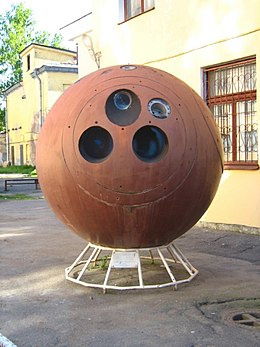LIMSwiki
Contents
 A Zenit reentry capsule | |
| Names | Zenit 2-5 |
|---|---|
| Mission type | Optical imaging reconnaissance Radiation |
| Harvard designation | 1962 Alpha Omega 1 |
| COSPAR ID | 1962-048A |
| SATCAT no. | 422 |
| Mission duration | 4 days |
| Spacecraft properties | |
| Spacecraft type | Zenit-2 |
| Manufacturer | OKB-1 |
| Launch mass | 4610 kg[1] |
| Start of mission | |
| Launch date | 27 September 1962 09:39:51 GMT |
| Rocket | Vostok-2 |
| Launch site | Baikonur 1/5 |
| Contractor | OKB-1 |
| End of mission | |
| Disposal | Recovered |
| Landing date | 1 October 1962 |
| Landing site | Steppe in Kazakhstan |
| Orbital parameters | |
| Reference system | Geocentric[2] |
| Regime | Low Earth |
| Perigee altitude | 292 km |
| Apogee altitude | 346 km |
| Inclination | 65.0° |
| Period | 90.9 minutes |
| Epoch | 27 September 1962 |
Zenit programme Zenit-2 | |
Kosmos 9 (Russian: Космос 9 meaning Cosmos 9), also known as Zenit-2 No.5, was a Soviet reconnaissance satellite launched in 1962. It was the ninth satellite to be designated under the Kosmos system, and the third successful launch of a Soviet reconnaissance satellite, following Kosmos 4 and Kosmos 7.[3]
Spacecraft
Kosmos 9 was a Zenit-2 satellite, a first generation, low resolution photo reconnaissance payload.[1] A reconnaissance satellite derived from the Vostok spacecraft used for crewed flights. In addition to reconnaissance, it was also used for research into radiation in support of the Vostok programme. It had a mass of 4,610 kilograms (10,160 lb).[1]
Mission
The Vostok-2, s/n T15000-06, was used to launch Kosmos 9.[4] The launch was conducted from Site 1/5 at the Baikonur Cosmodrome, and occurred at 09:39:51 GMT on 27 September 1962.[5] Kosmos 9 was placed into a low Earth orbit with a perigee of 292 kilometres (181 mi), an apogee of 346 kilometres (215 mi), an inclination of 65.0°, and an orbital period of 90.9 minutes.[2] It conducted a four-day mission, before being deorbited and landing by parachute on 1 October 1962, and recovered by the Soviet forces in the steppe in Kazakhstan.[6]
The next Zenit-2 launch will be Kosmos 10.[3]
See also
References
- ^ a b c "Cosmos 9: Display 1962-048A". nssdc.gsfc.nasa.gov. NASA. 27 February 2020. Retrieved 24 April 2020.
 This article incorporates text from this source, which is in the public domain.
This article incorporates text from this source, which is in the public domain.
- ^ a b "Cosmos 9: Trajectory 1962-048A". nssdc.gsfc.nasa.gov. NASA. 27 February 2020. Retrieved 24 April 2020.
 This article incorporates text from this source, which is in the public domain.
This article incorporates text from this source, which is in the public domain.
- ^ a b Wade, Mark. "Zenit-2". Encyclopedia Astronautica. Archived from the original on 23 May 2012. Retrieved 24 May 2009.
- ^ McDowell, Jonathan. "Launch Log". Jonathan's Space Page. Retrieved 24 May 2009.
- ^ Wade, Mark. "Soyuz". Encyclopedia Astronautica. Archived from the original on 7 January 2010. Retrieved 24 May 2009.
- ^ McDowell, Jonathan. "Satellite Catalog". Jonathan's Space Page. Retrieved 24 May 2009.

















